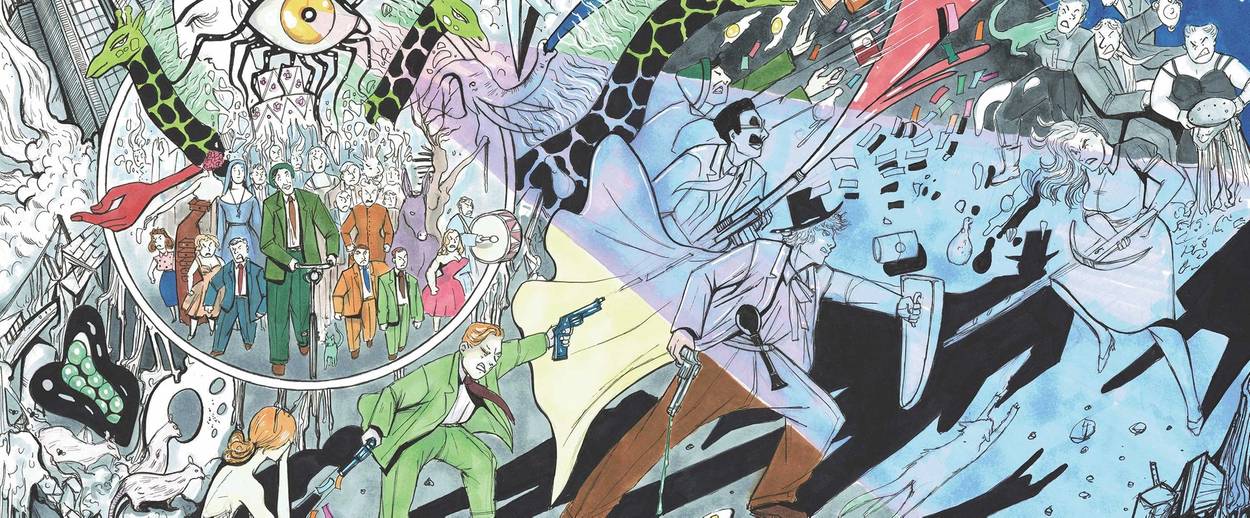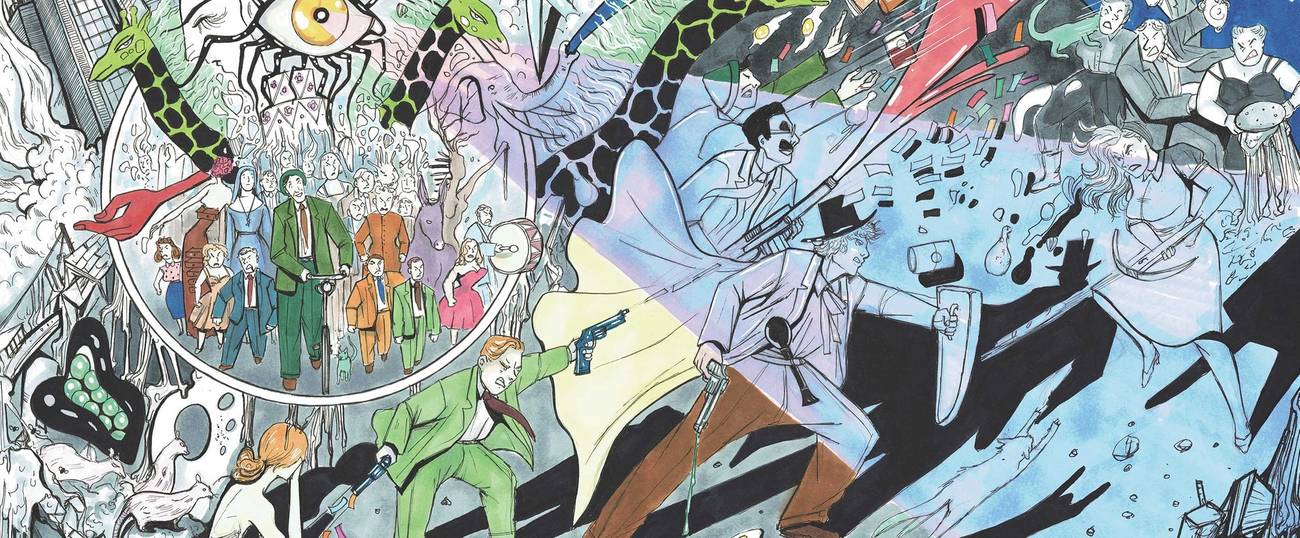The Marx Brothers in ‘Hello, Dalí’
An unrealized surrealist film project known as ‘Giraffes on Horseback Salad’ is rendered in comix, the latest of a century of Talmudic riffs on the disruptive vaudevillian outsiders




Some popular culture figures are so beloved we believe them eternal. Ninety years after the Marx Brothers’ first talking picture, The Cocoanuts, opened nationally on Aug. 3, 1929, a new Marx Brothers movie has appeared—or rather been published as a graphic novel, Giraffes on Horseback Salad.
Arguably the most successful vaudeville team in showbiz history, the Marx Brothers don’t only have appreciators but the sort of fanatical partisan defenders known in Yiddish as patriotn. The dream of these partisans is to bring Chico (1887-1961), Harpo (1888-1964), and Groucho (1890-1977; he would have turned 129 this week) back to life … in character.
I was one such fanatic, the author of a high school short story that imagined Groucho as a prankster president, owing something to Terry Southern’s The Magic Christian and even more to Duck Soup (a movie I loved so much, in those pre-home-video days, that I taped the soundtrack off the TV). Josh Frank is another, far more dedicated Marx Brothers apostle—the moving force or, better, the producer behind Giraffes on Horseback Salad, based on a 1937 screenplay that Salvador Dalí, then the world’s most infamous modern artist, wrote for the Marx Brothers. The dedication page even has a snapshot of the author, age 12, dressed as Harpo for Halloween.
Illustrated by the Catalan comics artist Manuel Pertega, Giraffes is the most recent and eccentric of Marx Brothers reincarnations, the realization of an impossible production. Other notable fantasy projects include Philip Roth’s imagined movie adaptation of Kafka’s Castle starring Groucho as the land surveyor K., with Chico and Harpo playing his two assistants, and A Day at the United Nations, a 40-page treatment prepared by Billy Wilder and I.A.L. Diamond in 1960, updating Duck Soup for the Cold War. Most outrageously, Robert Coover’s novel The Public Burning includes a three-page skit in which Groucho and Harpo impersonate the doomed defendants Julius and Ethel Rosenberg, with Chico as their executioner.
While the 1982 comedy Brain Donors was the closest thing to a Marx Brothers remake, an homage to A Night at the Opera (here ballet) with John Turturro in the Groucho role, the Marxes have been the subject of two original musicals, Minnie’s Boys and A Day in Hollywood/A Night in the Ukraine; in 2016, an enterprising young producer revived I’ll Say She Is, the 1924 musical that made the Marx Brothers the toast of Broadway.
Woody Allen may be in a class by himself. Having dressed his character’s parents in Groucho masks in Take the Money and Run, he declared his undying allegiance to Duck Soup in Hannah and Her Sisters, staged a costume party in which the guests all appear as Groucho as the climax of Everyone Says I Love You, a movie that takes its title from a song Groucho sings in Horse Feathers, and also had a hand in the 1982 television documentary The Marx Brothers in a Nutshell, a movie Frank cites with particular reverence as “the holy grail for a ten-year-old collector and fan (aka me in 1985).”
It should be noted here that the Marx Brothers were and are recognizably and indisputably Jewish. As the personification of popular culture, it was Charlie Chaplin who was imagined to be a Jew by his early audiences, by anti-Semites, and by Jewish writers from Sholem Aleichem to Hannah Arendt. Chico’s fake Italian accent notwithstanding, there was no imagining the Marxes as anything other than Jews—assertive ones, the epitome of disruptive, disreputable outsiders, at least in the five movies they made for Paramount. Some 40 years before Alexander Portnoy, the Marx Brothers put the id in yid.
Groucho, who in the 1950s was investigated by the FBI for nonexistent Communist ties, is credited with one of the most famous of all Jewish jokes, refusing to join any club that would have him for a member. Still, the Marxes were disinclined to discuss their Jewishness. Described by one critic as the “symbolic embodiment of all persecuted Jews for 2,000 years,” Groucho, characterized by a 1932 Time cover story as “the prototype of Hebrew wisecrackers,” supposedly responded: “What sort of goddamned review is that?”
In On the Road, Jack Kerouac cast Allen Ginsberg as one of the brothers: Carlo Marx. The underground filmmaker Ken Jacobs shot a scene for his mid-1960s 8 mm epic The Sky Socialist involving the Muse of Cinema and the Marx Brothers (taking the role of Chico himself). By then, the Marx Brothers were drafted as countercultural heroes, seen in the wake of A Hard Day’s Night as the forerunners of The Beatles. I’m not sure which one of the French soixante-huitards made the joke about being a Marxist-Leninist, meaning Groucho Marx and John Lennon. Yippies, notably Abbie Hoffman and Jerry Rubin, compared themselves to the Marx Brothers. According to Paul Krassner, Groucho was himself a sort of adopted yippie, an outspoken Nixon-hater who dropped acid (with him) in preparation for his role, a gangster known as God, in Otto Preminger’s amazing pro-LSD comedy Skidoo.
***
Although the Marx Brothers may be considered American equivalents to the dadaists (a movement with an East European Jewish pedigree) they also had a special appeal for surrealists and aesthetic successors like the theater of the absurd (Eugene Ionesco, sometimes imagined, like Chaplin, to be Jewish, once said that the three greatest influences on his work were Groucho, Chico, and Harpo).
In Le surréalism au cinéma, Ado Kyrou compares Duck Soup to Alfred Jarry’s anti-authoritarian burlesque Ubu Roi. In the early 1930s, Antonin (theater of cruelty) Artaud enthused over Animal Crackers (“a kind of exercise of intellectual freedom in which the unconscious of each of the characters, repressed by conventions and habits, avenges itself and us at the same time”) and Monkey Business (“a hymn to anarchy and whole-hearted revolt”). Jacques Brunius, who had served as assistant director on Luis Buñuel and Salvador Dalí’s L’age d’Or, praised the Marx Brothers as subversives, writing that “the derision which they hurl against the bourgeois world, Harpo’s erotic violence, Groucho’s lovable scurrility, could not arouse, more or less covertly, the powers of reaction and puritanism in the U.S.” Dalí himself bracketed Animal Crackers’ “entertaining schizophrenia” with the work of the protosurrealist writer Raymond Roussel.
Dalí particularly admired Harpo (“the one of the Marx Brothers having curled hair, this face which is that of persuasive and triumphant madness”). The two men met in Paris in 1936, beginning a friendship that would be concretized by Dalí’s brilliantly hostile Christmas gift—a harp with barbed wire strings. Harpo’s thank-you telegram hints at a possible collaboration. In January 1937, Dalí and his wife, Gala, were guests at Harpo’s Hollywood home and Harpo was the subject of two drawings and possibly a painting. Soon after, Dalí revised his script, La Femme surréaliste (The Surrealist Woman), as a vehicle for the Marx Brothers, and presented MGM with a treatment, now known as Giraffes on Horseback Salad.
While bits and pieces of Giraffes have surfaced over the years, Josh Frank unearthed a notebook of Dali’s ideas for Giraffes held by the Centre Pompidou as well as a hitherto unpublished treatment shown by Dalí to MGM, the studio that signed and tamed the Marxes. The scenario concerns a romantic triangle in which the protagonist, Jimmy, a brilliant inventor (and, like Dali, a Spanish exile in America) is torn between two women—the avaricious, vulgar, and unfaithful debutante Linda and the mysterious, magical, Surreal Woman who, attended by her friends the Marx Brothers, is capable of deranging the very cosmos.
Alas, despite its fascinating backstory Giraffes on Horseback Salad has an unhappy ending. It’s a tedious tale, laboriously told, better looked at than read—an example of MGM rather than Paramount Marxism. Frank is undoubtedly correct in his view that the script was Dalí’s reflection on his situation as a surrealist exile in America with all the narcissism that implies.
In lieu of MGM gentility, Giraffes is stocked with Dalí trademarks including his “Rainy Taxi,” “Mae West Lips Sofa,” and “Lobster Telephone” receiver. The titular giraffes, who appear at the Surrealist Woman’s feast, are another Dalí motif—first appearing in L’Age d’Or and, set aflame, in two paintings from 1937, “The Invention of Monsters” and “The Burning Giraffe.” Described by the artist as “masculine cosmic apocalyptic monster,” the creature was for him the signifier of impending war.
When it comes to triumphant madness, Giraffes is no Skidoo. Dalí’s studied surrealism doesn’t do much for the Marxes’ more intuitive brand, here drained of all spontaneity. Nor is Dalí’s dialogue a threat to simpatico screenwriters George S. Kaufman or S.J. Perelman (who claimed that Groucho’s persona was explained to him by producer Herman Mankiewicz as “an old Hebe with a cigar”). As Geoffrey O’Brien dryly observed some years ago, Giraffes’ “humorous potential can be gauged from the scene where Groucho tells Harpo: ‘Bring me the eighteen smallest dwarfs in the city.’” Small wonder that Frank and his co-writer, Tim Heidecker, are compelled to employ dialogue, gags, and bits of business lifted from Duck Soup and other Marx Brothers movies—thus rendering their adaptation unpleasantly academic.
R. Crumb aside, it’s hard to think of a comics artist capable of juggling the lowdown vaudeville and high-flown surrealism that the project required. Pertega doesn’t pastiche Dalí’s style but, if not always rising to the level of the psychedelic splash pages Steve Ditko drew for Marvel’s original Doctor Strange, her sinuously trippy-drippy breakdowns—mainly illustrating the “Surreal Woman’s” mind-bending, universe-contorting exploits—are Giraffes’ strongest graphic element. The weakest, unfortunately, is its representation of the Marx Brothers themselves.
Lesson to be learned: The Brothers are at their most effective in unhinging a more-or-less normal environment. Their presence is unavoidably diluted when, as in their MGM films that Frank has taken for his model, they play second fiddle to a producer-imposed love story. In this case, the imposition is Dalí’s imagination. There’s no yid there, and not that much id either.
J. Hoberman was the longtime Village Voice film critic. He is the author, co-author, or editor of 12 books, including Bridge of Light: Yiddish Film Between Two Worlds and, with Jeffrey Shandler, Entertaining America: Jews, Movies, and Broadcasting.